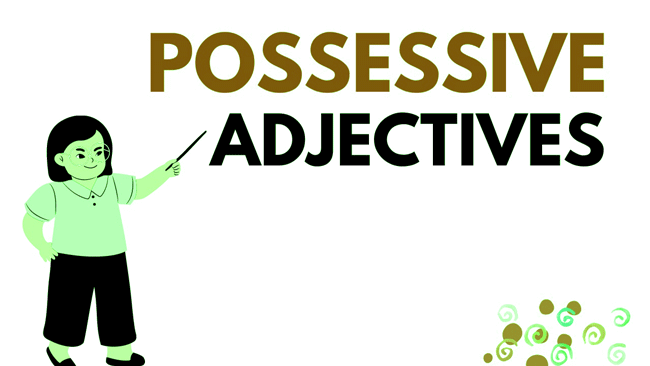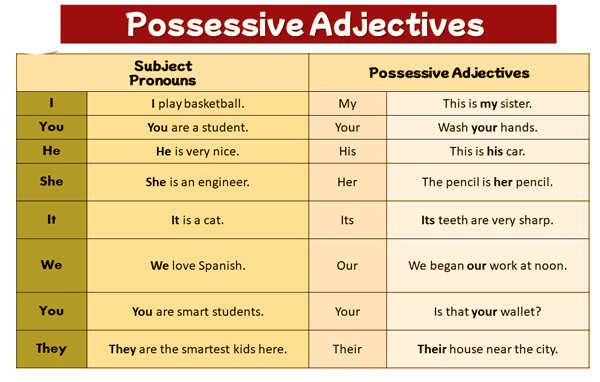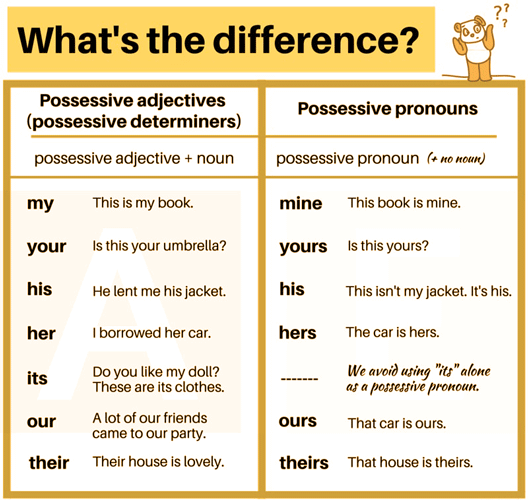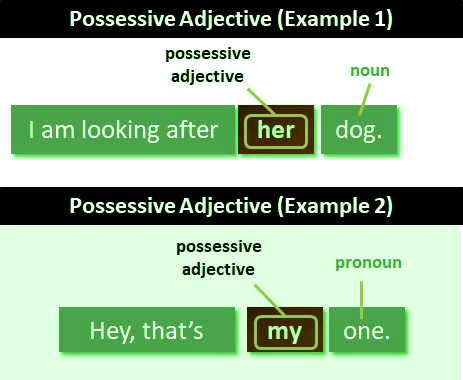Possessive AdjectivesA possessive adjective is a type of adjective that changes a noun by indicating who owns, possesses or controls it. In the line, Peter lost his cards. For example, the term his is a possessive adjective indicating that the cards pertain to Peter. My, your, his, her, it, our, their, and whose are the most regularly used possessive adjectives. These often relate to the pronoun like I, you, he, she, it, we, they, and who in that order. 
As the name implies, possessive adjectives are often used to denote possession or ownership. For instance, the adjective his is used in the line George puts his scarf on the chair to emphasize that George owns the scarf. Possessive adjectives can also be used to allude to figurative objects that someone possesses, as Alison explained her idea to me. Possessive adjectives can also be used to describe persons who have a connection to someone or something. For instance, the possessive word their is used in the line "Vidhi and Heena are with their grandparents" to convey that the grandparents are related to Vidhi and Heena; they do not "own" their grandparents, but they do have them. When choosing a possessive adjective, consider whichever pronoun you might use to denote the very same person or object that possesses or has the noun you are altering. As an example, The mother pigeon was constructing ________nest. The nest should be modified with a possessive adjective in this statement. The mother pigeon owns the nest. We would be using the pronoun she since the pigeon is female. Her is the possessive adjective that is utilised with she. As a result, our sentence must be as follows: The mother pigeon was constructing her nest. Possessive Adjective DefinitionPossessive Adjective has been defined by renowned dictionaries, let us have a look at the definition by them ;
Simple Possessive Adjective ExamplesThe possessive adjectives are highlighted in the instances below.
(The possessive adjective "your" before the noun "helmet" to indicate who possesses it.)
(The possessive adjectives "her" and "my" are used before (or altering) the nouns "cat" and "mouse" to indicate who possesses them.) In What Parts of A Statement Should Possessive Adjectives Be Used?Possessive adjectives, unlike most other adjectives, can only be used right in front of the noun they change: Correct: They went to my residence. Incorrect: This residence is my. Correct: The Tigers hunted their prey. Incorrect: I would like to give the tigers this object since I know it is theirs. Possessive Adjectives in Sentences: How To Use ThemPossessive adjectives are an odd part of speech. They act a little similar to pronouns and partly like adjectives, but at the same time they vary from each part of speech and have their own significance and function. Substituting Possessive NounsPossessive adjectives (also referred to as possessive determiners) have a special purpose in sentences. They not only alter nouns, but they also substitute possessive nouns that appear before those nouns, preventing your writing from seeming repetitious. (Note: Only third-person pronouns - his, her, it, their, and our - are used to replace nouns, as my and your always relate to me and you.)
Possessive Adjective AgreementPossessive adjectives follow the principles of pronoun agreement. They must coincide with the antecedent, which means that singular possessive nouns (Minni's, Karina's, and the dog's) must correspond to possessive adjectives (his, her, and its). The antecedent is usually obvious from a preceding sentence or other context indicators.
Possessive adjectives, on the other hand, do not have to agree with the nouns they have. The plural possessive adjective their agrees with the compound subject Johnny and Erica, not the singular noun letter, in the last instance above. Most Common possessive adjectivesAs stated above, the most often used possessive adjectives are:
A possessive adjective accompanies each personal pronoun. As a result, you may encounter additional potential possessive adjectives like hir and xyr that an individual may employ instead of the gendered pronouns like he or she. Other possessive adjectives may appear in addition to these. 
Possessive adjectives that are gender-neutral or nonbinaryThe words her and his are different in the given table of possessive adjectives. They are different in that they are often employed to define an individual's (or animal's) gender. However, these are very frequent adjectives, there are plenty of other possessive adjectives present that are not related with a specific gender. It is vital not to identify someone incorrectly, even if it is unintentional, by employing gendered terms when it is not necessary. Luckily, there is a straightforward method for ensuring that all gender identities are represented in your speech and writing: use gender-neutral terminology. If you're unsure which possessive adjective to use, or if you'd rather not use a gendered pronoun, the term their is really what you require. Their can be used as a single gender-neutral or non - binary substitute for the gender-specific adjectives her and his. (Other terms are often used in this way as well, but theirs is the most popular.) You can use this phrase when you don't require or want to define someone's gender. It can also be utilised to describe someone who identifies as nonbinary. In this case, it's critical to use the individual's favored adjectives (and pronouns). Possessive pronouns and possessive adjectivesPossessive adjectives cannot be used as the subject, object, or subject complement. Possessive pronouns, on the contrary, are necessary. Since they are pronouns, these terms can be used in locations where possessive adjectives cannot. The possessive pronouns for each pronoun and possessive adjective are as follows:
Note: Generally, it is not preferable to employ itself as the pronoun.
You'll see that the terms his and whose are both possessive adjectives and possessive pronouns for the terms he and who, making these two relatively easy to employ than the other terms. Determiners and possessive adjectivesUnlike nouns and verbs, adjective categories are frequently less defined. Many style guides and grammar resources, for example, regard possessive adjectives to be a category of words typically characterized as determiners, in which case they may be called to as possessive determiners or simply possessives. Possessive adjectives, unlike most other adjectives, can work similarly to pronouns in that they can substitute possessive nouns. The sentences "I spotted Tommy's cat, and I spotted his cat", for instance, have the same connotation. Furthermore, possessive adjectives cannot be transformed into superlative or comparative adjectives. Something could be slower than another, but it cannot be "our-er" or "my-er" than another. While these characteristics may justify defining possessive adjectives as a distinct figure of speech, terms like my, your, and our are considered possessive adjectives instead of determiners. However, not each style guide will use this concept, so don't be shocked if words like these are classed differently. Rules for possessive adjectives and best practices1. When it pertains to possessive adjectives, the most important thing to remember is not to employ them as nouns by accident. Possessive adjectives should not be used as the subject, object, or subject complement. Rather, use a possessive pronoun. ❌ Incorrect: This suitcase is my. ✅ Correct: This suitcase is mine. ❌ Incorrect: His kitten is wiser than your. ✅ Correct: His kitten is wiser than yours, OR His kitten is wiser than your kitten. 2. Another thing to keep in mind is that the possessive word their might pertain to a single person. While their and they are commonly used to refer to many individuals or objects, they may also be used to relate to a single person.
3. Since it is not a gendered word, their is a useful term to use if it is not known how an individual identifies themselves. I am meeting someone called James who has agreed to give me their annual pass. 4. The most common mistakes individuals make with possessive adjectives have nothing to do with grammatical faults but everything to do with spelling. The five mistakes listed below are quite common: A. Its and It's: The term it's is an abbreviation for "it is."
Never use the word "it's" whenever you mean "its" (or vice versa) The abbreviation "it's" has no bearing on ownership; it is not a possessive adjective. "It's" is an abbreviation meaning "it is" or "it has." This is a hard and fast rule. It's incorrect if you can not expand the term "it's" to "it is" or "it has." B. Your and You're: Another usual mistake is using the words "you're" and "your" interchangeably. Like "its" and "it's," one is a possessive adjective whereas the other is a condensed version of two words. While they may appear and sound identical, there is an important distinction between them. Your is a possessive pronoun, which means it means something that belongs to or is associated with the speaker. The term you're is an short form for "you are."
Don't use the word "you're" when you intend "your" (or vice versa). "You're" is a short form for "you are." This is a hard and fast rule. It's incorrect if you cannot enlarge your "you're" to "you are." C. Whose and Who's: "Whose" and "who's" are two frequently misunderstood words that are utilized in various contexts. "Whose" is a possessive determiner that indicates ownership or family ancestry, whereas "who's" is a short form for "who is" that is frequently utilized when asking inquiries regarding someone or something. Who's is an abbreviation for "who is" or "who has."
Don't use the word "who's" when you intend "whose" (or vice versa). "Who's" is an abbreviation for "who is" or "who has." This is a hard and fast rule. It's incorrect if you cannot change to full form i.e. "who's" to "who is" or "who has." D. Their, They're, and There: There are several methods to refer to somebody or something, the most popular of which are "there," "they're," and "their." These terms may appear to be extremely similar at first glance, but they have very different meanings. "There" is most commonly used to refer to a physical or abstract location. For instance, you could say "I'm traveling over there," or even say "There's nothing extra I can do." There is a popular word with numerous meanings; however, it is not used as a possessive adjective. In contrast, They're an abbreviation for "they are." As a result, it is frequently employed to denote the present or future tense. For instance, you may say, "They're thinking to make it to the conference" or "They're going to do their maximum." Meanwhile, "their" is just a possessive form that can be applied to individuals as well as objects. So you may say something like, "Here is their assessment card," or simply ask, "Whose file is this?" Is this theirs?" To summarize, while there may be certain similarities in their use and meaning, they each serve separate functions that make them helpful in different settings.
This is a hard and fast rule. It's incorrect if you cannot change to full form i.e "they're" to "they are." "There" (like the term "here") is a location. It's also used in phrases like "there are monsters" and "there's a problem." E. Don't use the pronouns "his/her." English has a problem with possessive adjectives. There isn't a single non-gender-specific one that can be utilized with people. We have "its," but "its" cannot be used with individuals.
("Its" cannot be used to refer to persons.) Examples of possessive adjectives in a sentence 
In each of the following statements, the possessive adjective is highlighted in bold.
Examples Of Possessive AdjectivesPossessive adjectives have been highlighted for ease of recognition. Read on to know some more instances:
Next TopicDirect and Indirect Speech Worksheet
|
 For Videos Join Our Youtube Channel: Join Now
For Videos Join Our Youtube Channel: Join Now
Feedback
- Send your Feedback to [email protected]
Help Others, Please Share









